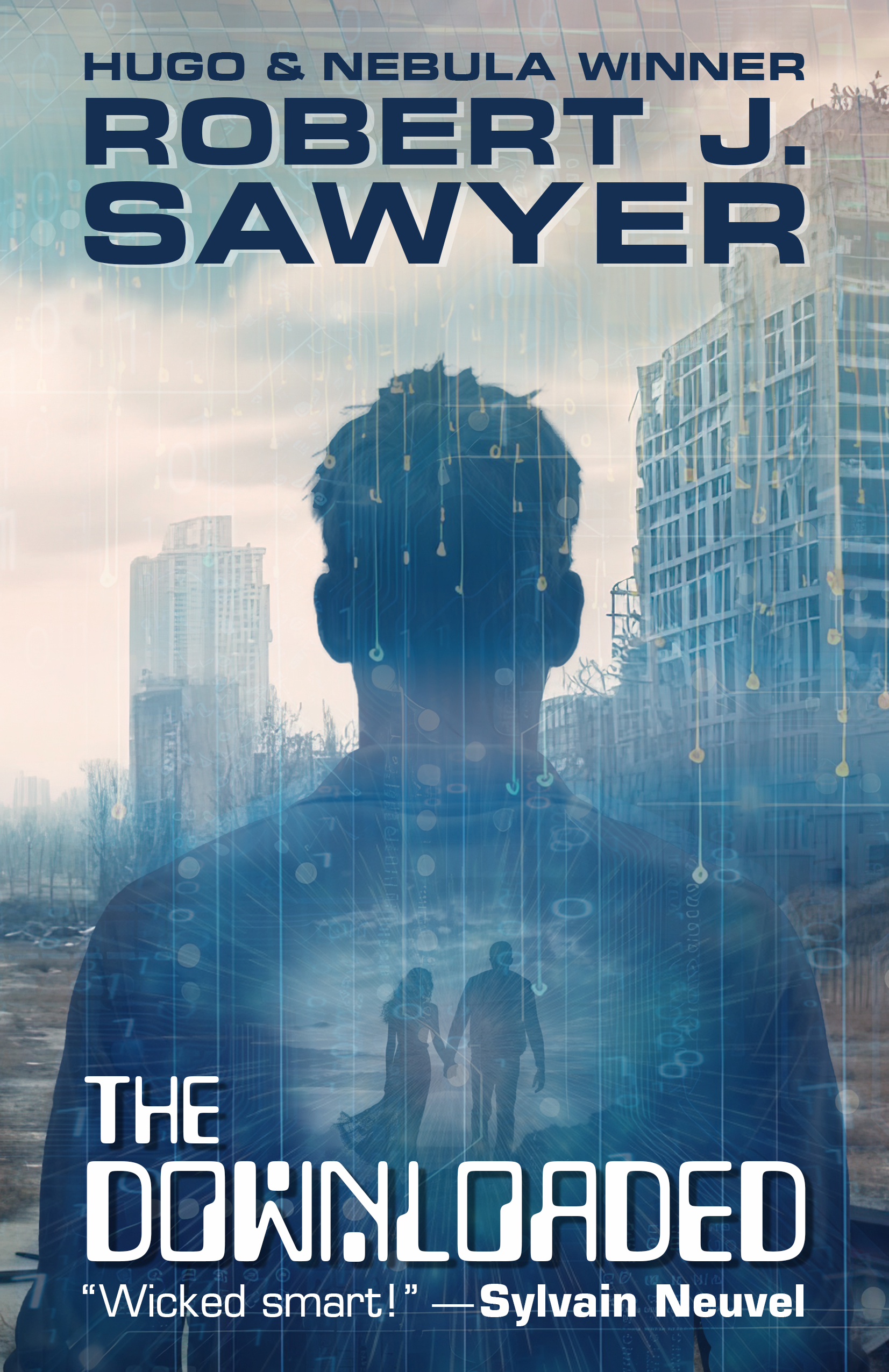
OBIR: Occasional Biased and Ignorant Reviews reflecting this reader’s opinion.

The Downloaded – by Robert J. Sawyer
To be published by Shadow Paw Press, Regina, Saskatchewan, Canada, in May 2024.
Cover art by Bibliofic Designs
Note: The Downloaded is currently available (and eligible for an Aurora Award) as a 2023 Audible Original with a full cast including Brendan Fraser.
Premise:
A powerful quantum computer contains the uploaded minds of a group of astronauts as well as the minds of convicted criminals serving virtual-reality prison sentences. A slight technical problem, namely the collapse of civilization, requires them to download in a hurry. What to do? And can they do it together?
Review:
I love a good mystery. And the initial mystery at hand is “What the heck happened?” The astronauts expected to wake up aboard a spaceship approaching a planet in another star system. The convicts expected to wake up being granted freedom for having served their time in cyber space. Neither group expected to be downloaded into their physical bodies 500 years after their due date. Strong coffee isn’t good enough to help you get over that sort of morning blah.
Of course there is an explanation available. But is it the correct one? Those prone to conspiracy theories (a nice modern touch) have their doubts.
And, as I’ve stated in these reviews many times, I love good concept-driven fiction. My advancing senility makes it all the easier to forget what I’ve written before, which is great, because endlessly repeating myself makes it all the easier to write these reviews quickly, but I digress…
Many concepts are introduced in this book: life in cyber space, just how annoying AI can be, can criminals be reformed, can scientists be reformed, what good is education, what good is intelligence, what good are psychopaths, how best to exploit catastrophe, do we live in a simulation, do we live in an alternate universe, what is the purpose of life, is immortality a good idea, what kind of society works best, what kind of government works best, how do you solve all our social problems, and so on. You think I’m kidding? These are just some of the conundrums being pondered in this book. That is why it is so delightfully fun to read.
Sawyer isn’t shy about offering potential answers or, at the very least, explanations. I suspect a lifetime of examining these questions has gone into the writing of this book. It’s a good adventure yarn, but also a philosophic study in its accessibility and practicality approaching that of the writings of Cicero (one of my favourite philosophers). But then, like Cicero, Sawyer has always had the knack of reducing complex thought into clear and entertaining wisdom which appears to make sense (whether it does or not is up to other philosophers, I guess). You will enjoy many things about this book, not least the mental stimulation.
The prose style is equally clear and precise, which makes for joyous storytelling that carries readers along quite nicely in the flow of events. One gets the impression the flow is simple and linear, so smoothly does it run, but no, there’s a lot of hidden complexity in form of unexpected twists. Just when you think you’re getting a handle on what’s happening, that you confidently know what to expect, Sawyer reveals a new piece of information which invalidates your assumptions. This transforms the plot arc into a waterfall of cascading expectations constantly evolving as you attempt to keep pace. You never really know what’s going on till the conclusion. All part of Sawyer’s masterful technique for writing page-turners hard to put down.
Especially interesting, for writers as well as readers, is the unusual structure of the book. It’s not divided into chapters. Instead, each “section” is a portion of an interview with this or that character recounting their experiences. On the one hand, an effective means of shifting point of view. On the other hand, a great way to further intrigue the reader. Who or what is doing the interviews, and when? At first this is not addressed. Then hints begin to appear. Finally, all is revealed and turns out to be a major contribution to the resolution of the plot. Remarkable technique. Works well.
And here’s the thing. I gather the book was conceived from the get-go as an audio book to begin with, to be followed by other forms of publication. The tone of each interview section is conversational, which certainly lends itself to its presentation as an audio book, not to mention making it far more interesting and fun for the voice actors (including Brendan Fraser!) to perform. Dare I suggest this is absolutely the way to go for anyone contemplating authoring an audio book?
And let me add, it’s not just a matter of dialogue. Concentrating on dialogue is a superficial and shallow, though possibly adequate, method of rendering a book suitable for listening. Sawyer’s method is far better. Each character is recounting what happened to them as if reminiscing, dwelling on the details that stand out in their memory, yet still focused on the essentials and what their experience means to them, as well as what conclusions they drew or at least assumed. You’re not listening to a radio play, but to storytelling at its best. With the added advantage that on the printed page it remains as vivid and evocative and informative as it is to the interviewer. Yes, a technique well worth emulating by anyone interested in writing specifically for the audio-book market, yet at the same time offering clear potential to follow up by more traditional means. Sound business practice methinks.
What about characters? Well, take any group of astronauts, and any gang of convicts, and you’re bound to wind up with some interesting oddballs one way or another. Sawyer utilizes his characters to explore what’s right and what’s wrong when depending on human beings to solve human problems. Taking into account being human can be said to be both a virtue and a fault, Sawyer gleefully focuses on complex characters who are a bit of both to the point of finding it hard to get along with themselves let alone each other.
Still, remembering traditions of The Right Stuff and all that, plus a century and more of crime fiction and movies, not to mention true-life crime tabloids, you can be forgiven for thinking the book will be a case of morally and intellectually superior astronauts whipping moral degenerates into shape, or possibly getting pulverized by same in the attempt. Essential good guys vs. bad guys stuff.
Not so fast. After all, some of the criminals were serving sentences for actions outside their normal behaviour, actions they regret, and besides, they underwent a great deal of rehabilitation while in cyber space prison. Perhaps their newly downloaded persona, if not exactly saintly, is decent enough to make for a good citizen? Apart from the habitual criminals who enjoy hurting others for assorted personal reasons, that is. In other words, a complex group of individuals who have at least one thing in common courtesy of their dealings with authority figures, namely proclaiming their innocence and acting accordingly as long as is convenient. To put it another way, the convicts are all still “on trial” as far as the astronauts are concerned, and mighty annoyed about it.
As for the astronauts… many are Alpha Male over-achievers, who sometimes tend to be intolerant of folk who aren’t quite as on the ball and efficient. Some are only astronauts in the sense they were chosen to travel to another planet; in actual fact they’re scientists, specialists in their field, who are prone to ignore all the inconsequential details outside their chosen area of expertise.
Now, what do astronauts, scientists and criminal convicts have in common? Obsession. They all tend to be fixated on what they be most passionate about, be it the sex-life of moss or their own sex-life, or the desire to acquire more of what they want, be it knowledge, empowerment through violence, or money.
Ah, but surely being more intelligent grants one the ability to rise above all that? Hah! I say again, hah! (And here I repeat one of my favourite themes again.) Greater intelligence can be good and useful, true enough, but it also generates a greater ability to rationalize and justify even the nastiest of behaviour. I won’t bore you with examples. Suffice to say if I see an example of greater technology landing on my lawn, presumably also an example of greater intellect and angelic behaviour, I will clear out of the neighbourhood as fast as my feet will carry me and let someone else find out if the beings emerging from the UFO are nice or naughty. The “To Serve Man” episode of the Twilight Zone I saw when it was first broadcast left a lasting impression on me, you might say.
All joking aside, many highly intelligent people often exhibit a curious lack of empathy, or so I’ve noticed in my lifetime experience. IQ is a poor measure to pre-judge. Besides, the “Monsters of the Id” often lead people astray. Nonsense? Well, speaking as someone who habitually struggled with extreme depression off and on for decades, I know for a fact that depressives routinely use the full power of their intellect to justify their depression when depressed. Consequently, I have no problem imagining that people who enjoy one-upmanship to the point of dominating and harassing others, even hurting them, or ignoring them, have no problem justifying their behaviour to themselves.
So, what’s my point? Simply that Sawyer has delineated some extremely interesting characters who intermesh in unexpected ways which greatly contribute to the ongoing tension as the plot unfolds. Few are out and out villains. None are saints. Many are easy to identify with, if only because they are so intriguing. Mostly, they’re a lot of fun to observe as they decisively stumble about attempting to blindly grope their way toward solutions in a forceful manner. Or, as the previous sentence clearly implies, attempt to untie the Gordian Knot of contradictions their current situation apparently consists of in order to stop feeling so helpless and doomed. Do they succeed? Read and find out. (Or listen and find out.)
Conclusion:
I haven’t even given away the name of a single character, much less offer spoilers. Instead, I have concentrated on explaining why I find the book so appealing and why I think you’ll enjoy reading it. As often happens with Sawyer’s books, I read “The Downloaded” in a single sitting (he had sent me a PDF advance review copy). Rollicking good fun both viscerally and intellectually I call it. Had a heck of a good time. You will too.
You can find it at Amazon to preorder: < The Downloaded >
Audiobook at Audible Original: < The Downloaded >










